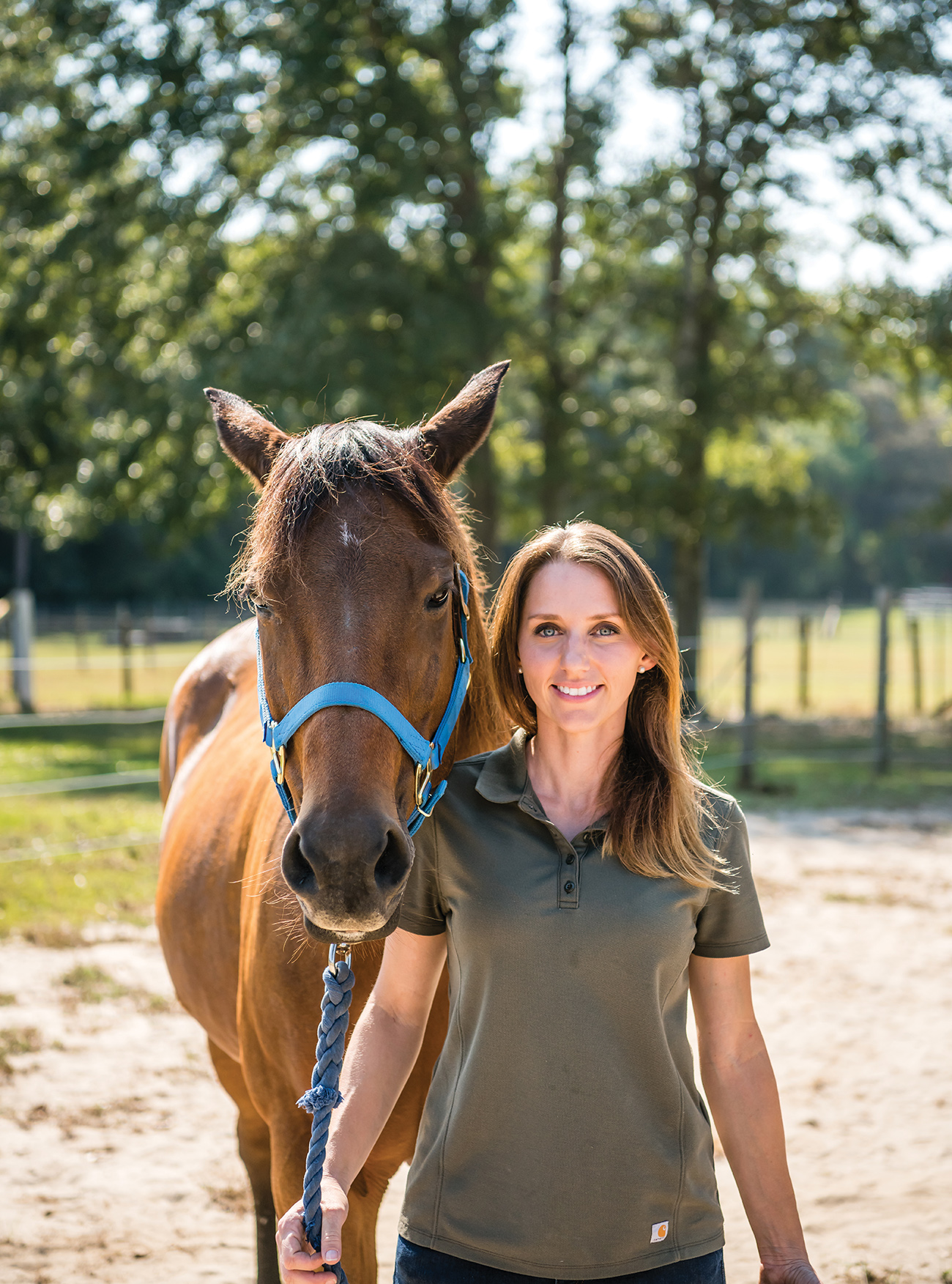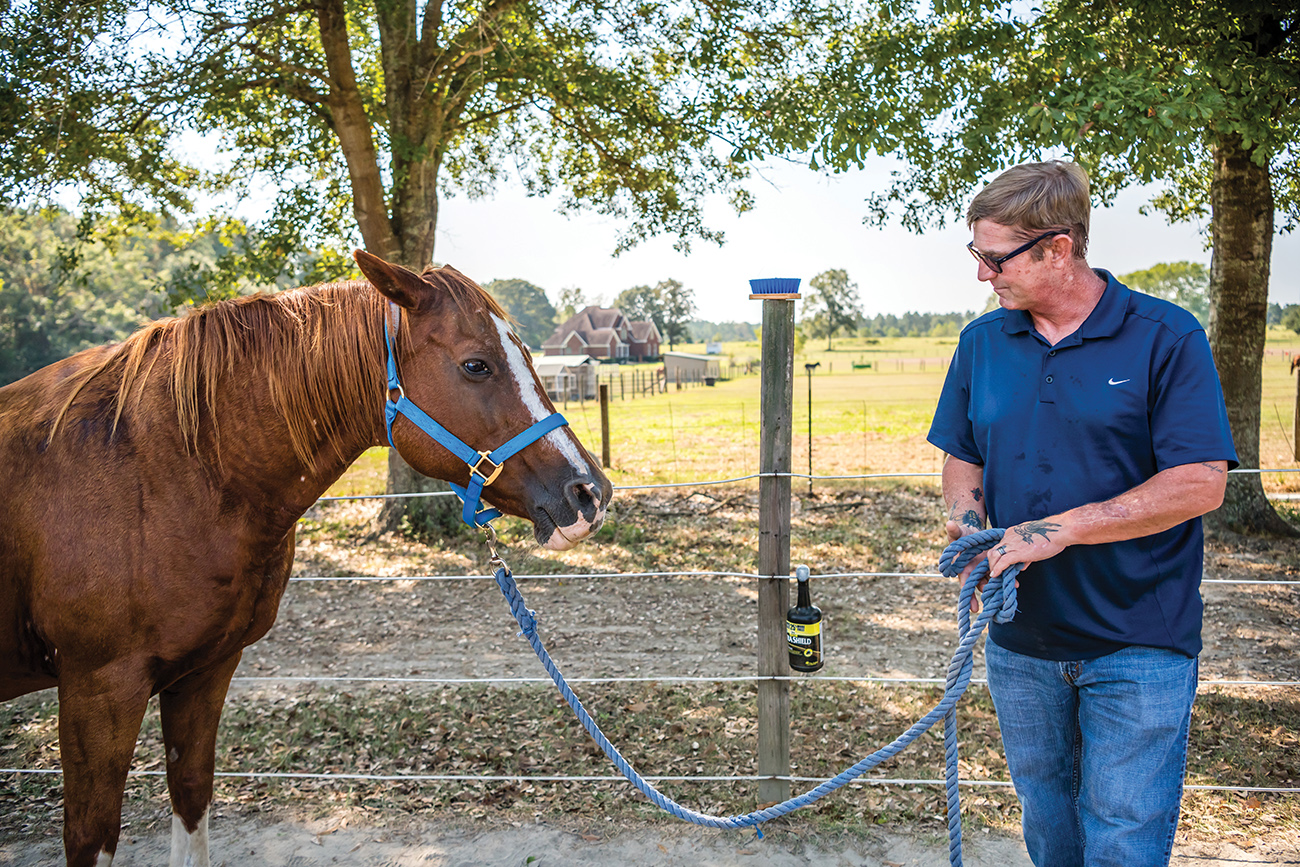
As an ammunition specialist E-4 with the U.S. Army, John Blackmon served with distinction in Operation Desert Storm. Like thousands of veterans returning home from war, the Daphne resident faced anxiety, depression and, in his words, “a bad run on life.” But Blackmon reached out for guidance, counseling and a horse with a helping hoof.
Blackmon is one of more than 1,000 graduates of Equine Therapy Group, which offers problem-solving solutions through hands-on horses at a beautiful 10-acre pastoral spread in Bay Minette. Behold the power of horse sense.
Now in year six, Equine Therapy Group develops a person’s positive behaviors and problem-solving abilities through a relationship with horses. Tools are given, techniques are taught and exercises practiced. Steed and human become trusted friends. But why horses?
“Because they respond to body language, not verbal commands,” says Equine Therapy Group’s founder, licensed professional counselor and self-professed “lifelong horse person,” Kari Whatley. “By your actions, a horse learns to trust or not trust you. The skills required to build a relationship with a horse are transferable to a person’s life. As clients undertake behavior patterns to work with horses, they become aware of similar behavioral changes useful for interaction with life issues.”
The scenic vista includes a herd of nine. Most of the four-legged counselors are rescue animals chosen for demeanor and temperament. Many are retired from the show ring or other venues. All share survival instincts that have kept horses alive since boarding Noah’s ark.
“Horses are prey animals, and they know it,” Whatley adds. “Herd members never face the same direction or nap at the same time.” They are always monitoring, updating their status and assessing the current situation — and that includes you.

“With horses, actions speak louder than words,” Whatley continues. “If you are tense, they pick up on it. Horses study your posture, breathing patterns and nervousness. They are one of the few animal species that recognize human facial expressions.”
During orientation, clients learn the basics: It’s all about the ears. “Ears up means a happy horse,” the instructor says. Ears down? It’s upset and, possibly soon, you will be, too. That’s part of the solution-seeking training.
After introductions, client and horse select each other for the journey in healing. Hoofed teachers and new students each sense who suits whom best — in most cases. “Now John was a bit different,” Whatley says, laughing. “Every horse out here liked him.”
Blackmon came onboard with little equine savvy but learned fast. “A horse weighs 1,000 pounds,” he says while coaxing a compliant, shoulder-high animal to follow his lead. “If it doesn’t want to move, it’s not going to.”
Once total strangers, the mare and Army veteran now walk together, thanks to principles learned in Whatley’s sessions. “Force doesn’t move a horse,” Blackmon adds. “Trust does.” Just like in real life.
No cowboy experience is necessary in the Baldwin County equine encounter; there is no horseback riding. These are clients, men and women seeking help, not rodeo stars.
They learn to work with powerful, yet peaceful, animals to maneuver through courses with various obstacles and checkpoints along the way. Each exercise is a metaphor for life.
For example, in one session, “Life’s Little Obstacles,” impediments are placed before the horse and client’s path. The two must work together to overcome barriers not unlike the obstacles and challenges of living: depression, communicating with a spouse or PTSD, to name a few.
“At first, I was baffled about being here,” Blackmon recalls about the day Veterans Court referred him to Equine Therapy Group. “I didn’t understand how a horse could help me.”
He was part of a six-member group of veterans with similar issues who completed the six-week course. “I learned to trust myself by trusting horses,” Blackmon recalls, whose depression was triggered by his father’s death in 2018. “Leading a horse past barriers helped me leave the past behind. It benefited me and helped my mental composure.”

Gently brushing the mane of Katie, a gentle steed and Blackmon’s former teacher, yesterday’s soldier ponders: “Today, my life is in a good place.”
Whatley says she wants more veterans “in a good place.”
“The Gulf Coast area has 65,000 veterans,” she says. “Some need help, but they never call. Their spouses, parents and friends do.”
She adds that once a vet starts to the program, they always come back, but getting them here is challenging. “I want them here before their situation becomes worse.”
In addition, Equine Therapy Group offers help beyond aiding veterans, providing support for struggling couples, family and behavioral problems, grief and bereavement, trauma, depression, anxiety, and by offering corporate retreats and team-building.
Whatley has been around horses since childhood, and today, she and husband Jason, the group’s business director / marketing man, live onsite. By design, horses are never far away.
She proclaims on the Equine Therapy Group’s website, “I have seen the impact horses can make, and it seemed only natural to make their best qualities available to those who need them most. For thousands of years, horses carried people to their destination of choice, and I’ve found that horses may still be the thing that helps get us from where we are to where we want to be.”





